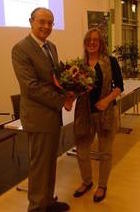Frau Dr. Katharina Lenner erhält den DAVO Dissertationspreis 2015
Die Arbeitsstelle Politik des Vorderen Orients gratuliert ganz herzlich Frau Dr. Katharina Lenner zum Erhalt des DAVO (Deutschen Arbeitsgemeinschaft Vorderer Orient) Dissertationspreises 2015, (für die beste eingereichte Dissertation im Jahr 2014)!
News vom 29.10.2015
Titel: Policy-shaping and its Limits: The Politics of Poverty Alleviation and Local Development in Jordan
Fachbereich Politik- und Sozialwissenschaften, FU Berlin, Dez. 2014
Betreuer*innen: Cilja Harders (FU Berlin), Christopher Parker (Ghent University)
This dissertation does not only provide a comprehensive and authoritative account of poverty alleviation and local development policy in Jordan. It makes also an outstanding contribution to our knowledge of how these fields have emerged over the past three decades. In addition, the study demonstrates why this emergence matters to our understanding of broader dynamics and meanings of political change in Jordan. Katharina Lenner situates the contemporary rationales and practices of poverty alleviation firmly with the history of development in Jordan, and within the context of contemporary globalization, calling attention to the complex and constitutive interplay between different contexts.
This outstanding original contribution to the study of Jordan also makes serious and compelling contributions to debates regarding the position of Middle East area studies within the discipline of comparative politics, the study of global development, and the range of methodological styles and positions available to political scientists.
The dissertation is innovative in drawing on and developing insights from across disciplinary fields – such as anthropology, geography, area studies, development studies, and political sciences. It is also innovative in combining this with the attention to the multiple sites at and through which policies and the power to implement and contest policy are articulated and diffused.
The empirical part of this dissertation is based on fine-grained case study research. While not a full-blown ethnography, the study makes compelling use of participant observation, field notes documenting the political significance of seemingly everyday encounters and other ethnographic techniques. Katharina Lenner`s patient and persistent approach to field research, and her willingness to let the facts of the case challenge and revise her theoretical preconceptions, point to a truly praiseworthy intellectual openness. Her dissertation shows that she is an outstanding researcher capable of drawing original insights from the field, engaging critically with salient academic debates, and making innovative and critical links between the two.
Congratulations to the author for her important and original contributions to our knowledge of Jordanian political life, her contribution to the critical study of development, and her contribution to the analysis of contemporary “global practice” more generally!


